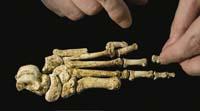The small brain and big feet, protagonists of the debate on the man of Flores

The results of two studies have been published in the journal Nature, but not all of them are accepted by experts
Paleontologists do not agree with the origin of Homo floresiensis. It is difficult to know whether it is a hominid species or a distorted case of another species. The debate arose long ago; the latest data come from two articles published by the journal Nature.
In one of them, researchers at the Natural History Museum in London analyze the brain of Flores' man. It is a very small brain, about a third of the conventional man. Therefore, researchers in London have compared another similar case, that of Madagascar's Nanos hippos. Of the fossil skulls of fifty hippos, the evolution of brain size has been studied. The brain of the nano hippo has lost a large volume in the last 1,500 years. According to experts, this decrease could also occur in other isolated species of an island, such as the man of Flores.
The authors of another article, Stony Brook University in New York, have investigated the feet of Flores' man. They are very large feet, suitable for walking but not for running. And the fingers also have a special appearance: the thumb is parallel to other fingers, but to a much lesser extent. Researchers claim that there is no other hominid with feet of this proportion.
The results of these articles have been questioned by paleontologists, especially the explanation of brain decline. Field Museum of Chicago biologist Robert Martin says that nanosand hippopotamus is a single-species research that is not enough to explain the human. Many other experts say it is not logical that the owner of a small brain can make tools.
The answers may be in the DNA study, but they have failed to extract DNA from the bones they have acquired to date. The debate is still alive.





